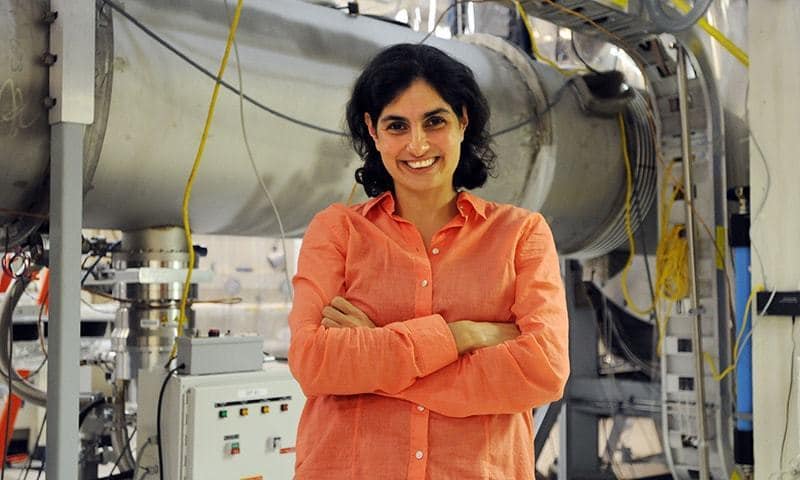Nergis Mavalvala, a Pakistan born American physicist, is the first woman to be appointed as dean in the history of the Massachusetts Institute of Technology (MIT), a university in Cambridge, United States.
Nergis is a renowned scientist for her work in Astrophysics. She has been serving the Massachusetts Institute of Technology as an associate head of physics since 2015.
Prof. Nergis Mavalvala holds a Ph.D. degree in physics with her special work in astronomy.
Nergis Mavalvala has pioneer work in gravitational waves as a researcher at MIT university. She has received several awards for her pioneer work in the field of astrophysics.
She has recently been appointed as the dean of the university’s School of Science. The university recently released the notification of her appointment as dean.
The President of MIT, L. Rafael Reif. praised Nergis saying:
What excites me equally about her appointment as dean are the qualities I have seen in her as a leader: She is a deft, collaborative problem-solver, a wise and generous colleague, an incomparable mentor, and a champion for inclusive excellence. As we prepare for the start of this most unusual academic year, it gives me great comfort to know that the School of Science will remain in such capable hands.
Provost Martin Schmidt announced the news in a letter emailed to the MIT community:
“I very much look forward to working with Nergis and to benefiting from her unerring sense of scientific opportunity, infectious curiosity, down-to-earth manner, and practical wisdom. I hope you will join me in congratulating her as she brings her great gifts as a leader to this new role.”
Mavalvala was born in Lahore and completed her education in Karachi.
She joined MIT for her Ph.D. degree. Her work Collaboration in the detection of gravitational waves is her honor.
During her PhD she got a chance to dove into the major project of her life, helping Weiss to build an early prototype of a gravitational-wave detector as part of her Ph.D. thesis.
Weiss’s idea resulted in Laser Interferometer Gravitational-Wave Observatory. LIGO helped in the detection of the gravitational wave.
LIGO was a historical discovery that makes way for Weiss and others for the 2017 Nobel Prize in physics.
Nergis Mavalvala also leads the Laser Interferometer Gravitational-Wave Observatory (LIGO). This also paves her path back to MIT journey as a faculty member when she first joined MIT as an associate professor in 2002.
MIT news represented institution thoughts on the new addition of Nergis Mavalvala as dean;
“Nergis’s brilliance as a researcher and educator speaks eloquently for itself, What excites me equally about her appointment as dean are the qualities I have seen in her as a leader: She is a deft, collaborative problem-solver, a wise and generous colleague, an incomparable mentor, and a champion for inclusive excellence. As we prepare for the start of this most unusual academic year, it gives me great comfort to know that the School of Science will remain in such capable hands.”
Nergis Mavalvala reacted to news of being named as dean, She said:
“As someone in a leadership position, that means you have opportunities to make an important and hopefully lasting impact.”
Nergis Mavalvala is very excited and optimistic about her plans as a dean. She credits her predecessors for making her way into this opportunity. She especially credited “Michael Sipser” ex dean of the school of science MIT.
“In some ways, the years leading up to the pandemic have been good years for MIT from the side of scientific discovery, and our impact on the world,” Mavalvala says. “I’m awed by the number of things that Mike has done and has left in good shape. I will always be grateful for that, and plan to carry on with the many things that work well, while also continually improving what we do and how we do it, as needs and demands shift.”
She further stated:
“MIT is one of the top places in the world for doing cutting-edge science, and we will continue to maintain that eminence. At the same time, we also have to push on issues of diversity, issues of racial and social justice, and work-life balance”
She also received the “Lahore Technology Award”. Mavalvala is a member of the National Academy of Sciences (NAS) since 2017.
From the chemistry teacher in Pakistan to the faculty of MIT, her success journey is truly inspiring.
She is an inspiration for all of us and makes us realize we can achieve anything in our life with hard work.
Also Read: Pakistani Madrassa Students Qualified For The Finals Of Turkey’s Tech Competition TEKNOFEST

Hi 🙂 I just want to mention I am just very new to weblog and certainly enjoyed youre page. Almost certainly Im planning to bookmark your site . You really come with terrific posts. Thanks for sharing with us your blog site.